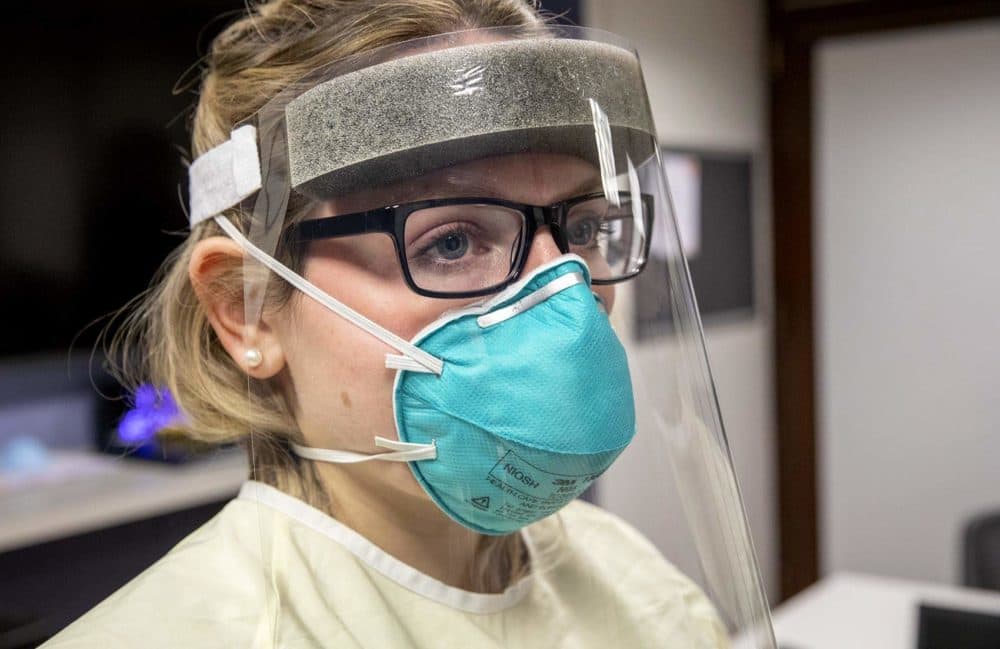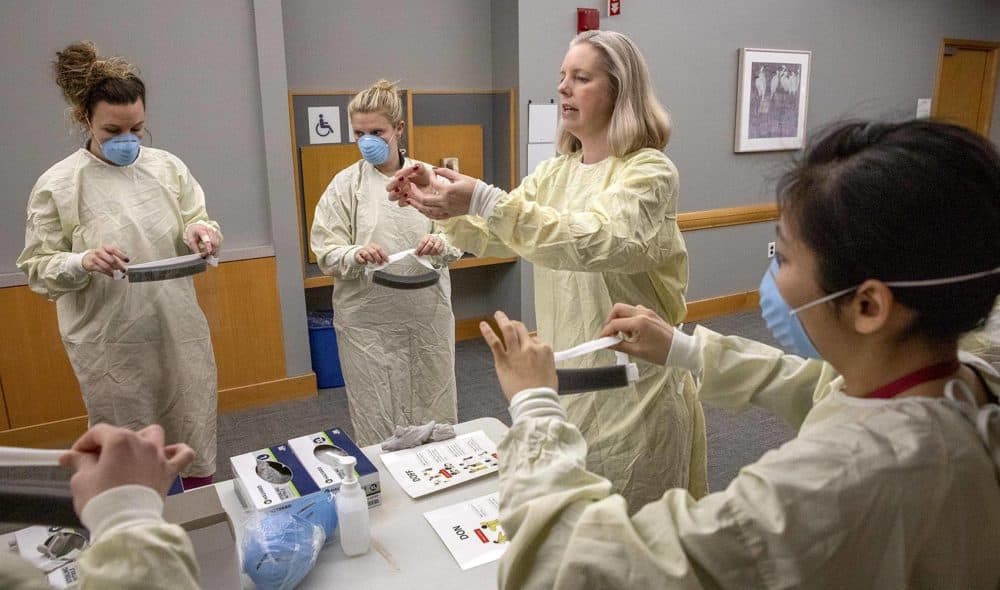Advertisement
Gown, Mask, Face Shield, Gloves: Preparing For Coronavirus At A Boston Hospital
ResumeAt Tufts Medical Center in Boston's Chinatown neighborhood, a dozen staffers are getting a brief lesson on PPE — that's personal protective equipment — against the new coronavirus.
Trainer Janice McLaughlin has her students get gowned up first, cautioning them to make sure the gowns are on properly.
"If we're safe, then the patient is safe, and the next patient is safe, because we're properly protecting ourselves," she tells hospital workers arrayed around a long table.
Next, she explains how to put on a face mask, noting that it's the same sort of protection against airborne germs used for tuberculosis or measles. What's unusual comes next: face shields, transparent rectangles of plastic that cover the entire face.
"We often forget our eyes are mucus membranes too, and we need to protect our eyes," she says. "And any time we have someone on airborne droplet precautions, that's spread through a respiratory channel — we really don't want anyone coughing on our face."

Gloves complete the ensemble. In the last few days, McLaughlin and others have trained or given refresher courses to more than a thousand Tufts Medical Center staffers on how to "don" and "doff" personal protection against the coronavirus, the hospital says — part of widespread preparations in case the virus spreads here.
So far, there's only been one confirmed case in the state: a UMass Boston student just back from China, who is recovering well at home. But hospitals are training staff in case there are more.
Happily, at Tufts Medical Center, there's been little call to apply the training fully, because no patient has met the federal criteria to qualify as a "Patient Under Investigation," or PUI.
Dr. Shira Doron, the hospital epidemiologist, says many people with concerns have been evaluated. "Some were not sick at all," she says. "Some had respiratory symptoms. Some had other symptoms. We actually have not deemed anyone a PUI."
The hospital is actively screening all patients, she says, asking about recent travel and symptoms. If someone has coronavirus symptoms, like fever and shortness of breath, and has recently been to China, then "the first thing that we do is we ask that the patient be masked and put into a private room with the door closed."

The personal protective equipment is brought in, and the patient is evaluated some more, including for other possible explanations of their symptoms. If a diagnostic test for coronavirus were needed, the sample would have to be sent off to the CDC, Doron says — for now.
"But by next week, and certainly the week after, we hope the testing will happen here in the state," she says.
The CDC says it has now begun shipping test kits to state labs.
The virus is new, Doron says, but the equipment for dealing with it is not.
"We're not using Ebola suits to take care of coronavirus," she says. "It isn't as contagious as Ebola. It isn't as contagious as measles. It is about as contagious as the flu."
Still, handling possible cases is demanding, says Dr. Paul Biddinger, chief of emergency preparedness at Mass. General Hospital.
"Patients may have to stay isolated, sometimes for days, in a home or in a hospital setting, depending on how ill they are, being monitored by medical and public health personnel until we have a definitive negative test," he says. "Which is what's happening hundreds of times around the country, unfortunately, right now."
Biddinger would not comment on how many patients Mass. General has asked the CDC to test for coronavirus. The hospital is a designated center for dealing with new outbreaks, he says, "but people should follow public health advice. They don't need to seek medical care unless they feel ill or public health authorities tell them otherwise. And they definitely don't need to go to a specialized hospital."
All hospitals have special space for contagious patients, and so-called "surge" space for a big influx, says Patricia Noga, vice president of clinical affairs at the Massachusetts Health and Hospital Association.
They all prepare for epidemics, she says — and their capacity to handle outbreaks, from medical treatments to communication, has improved "because we're always working at it. We're always trying to be prepared to address the next issue that arises."
Biddinger says hospitals are extra busy these days — with flu, not coronavirus.
"Right now, there is no sustained transmission in Massachusetts, in New England, in the United States, of coronavirus," he says. "And so right now, people's risk of being exposed in their daily lives is vanishingly small."
At Tufts Medical Center, trainer Janice McLaughlin tells her students that the alarm around coronavirus seems to have diminished.
"Things are slowing down a bit, and there's less hype around it," she says.
But the situation is fluid, she adds, and if recommendations change, the staff will be informed.

This segment aired on February 7, 2020.
